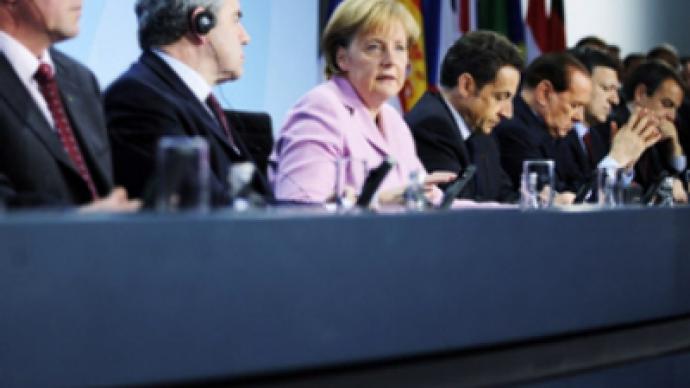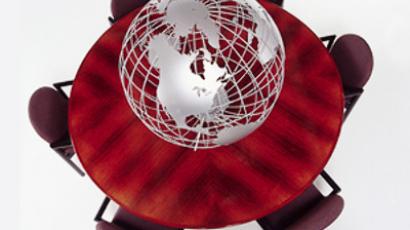European G20 leaders seek common ground

The European G20 leaders met in Berlin on Sunday to form a co-ordinated plan on how to proceed with global financial reform ahead of the main G20 summit meeting in London in April.
The Heads of State of Germany, the U.K., France, Spain, Italy, the Czech Republic and the Netherlands were joined by European Commission President Jose Manuel Barroso in deciding that tighter stock market regulation and a doubling of the International Monetary Fund's resources to 500 billion dollars were required to not only restore confidence in the global financial system but also to avoid a repeat performance of the current economic crisis.
The leaders of the largest economies in Europe gathered in freezing, snow-covered Berlin to try a form a common line ahead of the London summit.
However, it was the current economic climate rather than the frosty weather conditions that was up for debate.
Emerging from their talks, the leaders pledged to the world a new financial framework. It included; doubling the resources of the IMF, regulating hedge funds, sanctions against tax havens and refraining from any protectionist activities within their own economies.
They will now take this message to the forthcoming summit in London where concrete actions are necessary if market confidence is to be restored and the world can get back on track in terms of growth and employment.
The leaders repeatedly described this gathering as a 'staging post' between the Washington G20 meeting in November 2008 and the London summit to be held this year.
German Chancellor Angela Merkel, who invited the leaders to attend the preparation meeting, told the gathered press, “Confidence can only be restored if people feel we, as nations, are pulling together.”
The notion of restoring confidence was also echoed by British PM Gordon Brown who said, “Our co-operation will instil confidence in our systems and build for the future.”
Merkel hopes by facilitating this session, confidence in her leadership will also be boosted alongside confidence in the financial systems.
With the prospect of German elections in September, over-shadowed by the country's biggest economic downturn in 60 years, Merkel has stepped out of her previously perceived inertia in order to host the assembly.
Mindful of how the German electorate will judge her crisis management skills come election time, the chancellor is recasting herself as an international leader to be reckoned with.
Chancellor Merkel is not alone. Her fellow Heads of State were singing from the same song sheet, declaring the importance of restoring confidence in the financial systems and, probably more importantly, attending a meeting that gives them the appearance of action in this time of crisis.
“Washington was a very important meeting, London is also an important meeting and Berlin is a staging post between the two,” Chancellor Merkel told a packed room in the Chancellery. “We have made mistakes in the past when banks did not set up buffers for their deposits but now we have to move forward and we are in favour of opening world trade without protectionism.”
Merkel was roundly thanked by the respective leaders for facilitating the session but the Heads of State were also quick to point out that, despite the accord between the countries, there are tough months to come.
“There are testing times ahead,” warned Gordon Brown. “Our priorities are homeowners that are worried about their mortgages, workers who fear for their jobs and business that fear for their survival. We need to re-establish the trust in our banks and ensure they are stewards of people's money rather than speculators in people's money.”
French President Nicolas Sarkozy was also in a foreboding mode, “We must ensure London is a success. We have to be clear from the outset that these are not superficial measures. Punitive measures are key to these new systems otherwise these new measures will have no meaning. We have no choice come April 2nd. We must succeed. If we fail there is no safety net.”
Italian Prime Minister Silvio Berlusconi agreed that cooperation with his European counterparts was essential to re-writing the global financial standard but he was quick to point out that Italians were not suffering to the same degree as their neighbours,“My country is in a relatively better situation to deal with the current crisis. Italy has a very solid banking system, there is little corruption and we have not the same level of toxic assets as others. Those Italians that do lose their jobs are in a better situation than some of the other countries here.”
Berlusconi's comments drew some laughter from some sections of the press but the Italian was nonplussed and was seen sharing jokes with some of the other leaders while EU European Commission President Jose Manuel Barroso had his turn to speak.
New financial framework
The common stance formed on overhauling global financial rules ahead of a broader summit of G20 nations in London may be seen as closing the stable door after the horse has bolted. But the leaders were steadfast in their consensus that this was the best way forward.
Of the measures raised, questions still remain whether this is truly a group effort. The European leaders repeated the mantra that they would refrain from protectionism, yet during a recent TV interview, French President Sarkozy suggested local car makers should be entitled to federal government aid.
Berlusconi remarked after that interview, France's measures to support the country's automobile industry “smell a bit like protectionism.”
The joint statement released in Berlin gave a weakened assessment of protectionism,“We will take only measures that keep distortions to competition to an absolute minimum.”
An absolute minimum still allows for a degree of protectionism, suggesting the European leaders may not be as harmonious as the meet suggested.
Also, despite the fact that the Berlin joint statement alluded to sanctions to safeguard against tax havens and 'uncooperative jurisdictions', it fell short in explaining what form these punitive measures would actually take.
Regardless of the issues arising from this framework, this is still only half the work. The real importance is the success of the London summit.
The Washington G20 meet involved mainly planning; the London assembly will now need to provide real and proper action.
Berlin may have focused the European leaders into finding common ground but without tangible results in London this mini-summit may be remembered as a mere display of activity rather than a worthwhile exercise.
Ciaran Walsh for RT













